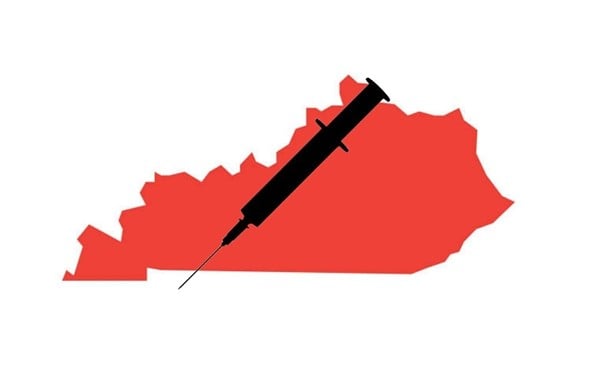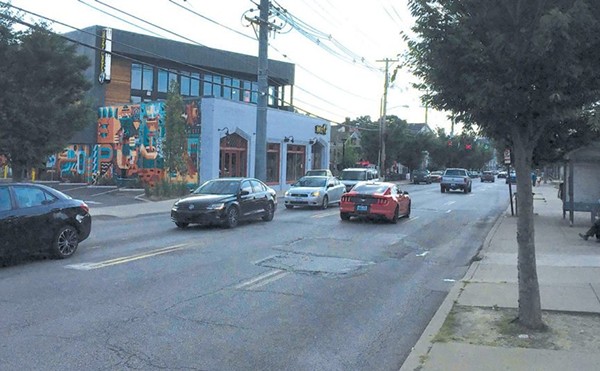
Donovan Reynolds, WFPK
Donovan Reynolds is a newsman at heart. He estimates he’s spent two-thirds of his four decades in radio as a reporter. He’s probably a stickler for details. So he may have been surprised, during interviews and media coverage of his recent hiring as the new president of the Public Radio Partnership, that he wasn’t asked about his controversial departure from his previous job, from which he resigned on March 1 after uncovering evidence that three employees had engaged in unethical and illegal activities.
“I had to do a lot of soul-searching and chose to hold myself responsible,” he said from Ann Arbor as he prepared for the move to his new home in Cherokee Triangle. “I made a tough decision to give the organization and myself a fresh start.”
Reynolds was director of Michigan Public Media, a station operated by the University of Michigan. By all accounts, during his 10 years there Reynolds led a remarkable turnaround, taking a station that had nearly lost its federal funds in 1996 to one that set a slew of records for fundraising and listeners. To accomplish the transformation, he changed from a classical music format to news and information.
The downside of his last job: Three former station employees were charged in March with embezzlement by Washtenaw County prosecutors. (Two have subsequently plea-bargained their cases, and the third was recently convicted.) The three, including the station’s deputy director, were accused of making in-kind trades for massages, meals and airline tickets.
“It was a huge tragedy for the organization and for me. I felt

Donovan Reynolds, WFPK
Reynolds was not accused of any wrongdoing, but in March he told the Web site Current.org that he took the fall because the finagling occurred on his watch. That story said Reynolds triggered the investigation by reporting financial irregularities, and said he ultimately “trusted the wrong people.”
So what has Reynolds learned from the experience?
“I’m probably going to be a tougher and more skeptical manager and be in more of a ‘trust-but-verify’ mode,” he told LEO. “But I’d rather get in trouble from trusting people too much than not enough. You can find yourself in trouble either way.”
It sounds like Reynolds did the right thing in Michigan, and that the blip in an otherwise stellar radio career was just that — a blip. —Rick Redding
Corporate eye for the black guy, Part I
Fourth Street Live, the Wal-Mart of drunken debauchery, woke up with yet another lawsuit hangover last week, when two more African-American men sued two of its nightclubs for denying them entrance because of their race. It’s the second lawsuit in as many weeks against Red Cheetah and Parrot Beach (two names that must sound hilarious in a deposition), and comes after a long history of the clubs not-so-subtly insisting their patrons dress like white people.
Both recent lawsuits charge that the men were barred from the bars because their shirttails were out, even though whiter patrons inside wore similar attire and even though the men offered to tuck the offending tails. Earlier this month, Jefferson Circuit Judge Ann O’Malley Shake ordered Cheetah and Parrot to ix-nay on the (alleged) acism-ray and post their dress codes prominently, and then to get into the 1960s and enforce it equally among blacks and whites. The clubs have complied with the posting order and emphatically deny any discrimination.
The controversy over the dress code dates back to the opening of Fourth Street Live, which has been Keeping Louisville the Opposite of Weird since 2004 by banning team apparel, backward ball caps and brand-name gear from its quasi-public array of synthetic drinking establishments and nipped/tucked fern eateries. Because the space on Fourth Street is sometimes public and sometimes private, and because any dress code by nature must be enforced on the spot, the controversy has garnered the attention of everybody from the ACLU to the mayor’s office to the Metro Human Relations Commission. Judge O’Malley Shake (whose name would also make an excellent Fourth Street Live establishment) will take up the matter again on Aug. 25. —Jim Welp
Corporate eye for the black guy, Part II
The Association of Community Organizations for Reform Now, or ACORN, released its annual report on lending and homeownership in America on Tuesday. Examining 130 cities, the report’s warning is in its title: “The Impending Rate Shock.”
Pathetically, the results are an extension of what previous recent studies have shown: If you’re a minority in this country, even one who earns a good keep, you’re significantly more likely to get a shitty rate on a home loan.
Welcome to the real American Dream.
The ACORN study found high-income African Americans are four times as likely to receive a high-cost loan as affluent whites. In Louisville last year, 21 percent of all home loans were high-cost. Of the refinancing loans made to African Americans, 51.8 percent were high-cost. Twenty-eight percent for whites.
According to the Foundation for National progress, one in four sub-prime lenders are predatory. These swine screw you by offering terrible rates way above market, disallowing prepayment and dropping heavy upfront fees. They target low-income and minority homebuyers who tend to have credit trouble, often setting up shop in low-income neighborhoods.
Additionally, data compiled by the Metropolitan Housing Coalition in Louisville shows that the housing market here was nearly as segregated in 2000 as it was in 1960.
So much for progress. —Stephen George
Don’t Sieg-Heil, don’t tell
Moms of teenage boys and other military-draft watchers breathed a sigh of relief when the Army announced that it expects to meet its fiscal-year 2006 recruiting goal, putting to rest — at least temporarily — always persistent rumors of an impending U.S. draft. The Marines, Navy and Air Force are also on target to meet goals. With the world in flames, troops in Iraq under a daily suicide-bomber siege and Cowboy George rattling sabers at everybody from Iran to Syria to North Korea, how does the Pentagon continue to meet recruitment goals?
Jeff Spara, in charge of the Army’s recruiting policy, told The Washington Post that the Army did it by offering monetary incentives, raising the enlistment age to 42 and by relaxing a ban on “certain types of tattoos.”
The Southern Poverty Law Center thinks it knows what kinds of tattoos. The Alabama-based civil rights watchdog group says the military is accepting large numbers of neo-Nazi skinheads, and it presented evidence supporting that claim to Defense Secretary Donald Rumsfeld, along with a photo of a Navy SEAL Sieg-Heiling in front of a flaming swastika at a May 2000 Imperial Klans of America rally in (ouch) Kentucky.
And why are skinheads so eager to serve in Iraq? Good training for the “coming race war and the ethnic cleansing to follow,” according to one white-supremacist group’s recruiting materials, as reported by the SPLC.
If the military will look the other way when skinheads sign up, they’ll take anybody, right? Well, no. The Defense Department announced this week that Ft. Campbell kicked out 49 gay soldiers in accordance with the Army’s “Don’t Ask Don’t Tell” policy last year — the second-highest tally of any base. —Jim Welp
Contact the writers at
[email protected]





